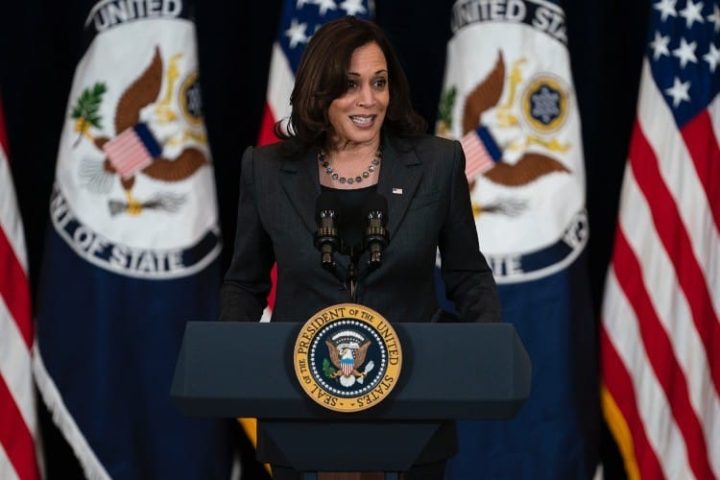
Vice President Kamala Harris is adding another priority to her portfolio: the National Space Council.
Harris confirmed her new role on Saturday, writing in a tweet, “As I’ve said before: In America, when we shoot for the moon, we plant our flag on it. I am honored to lead our National Space Council.”
Harris “intends to put her own personal stamp on the Council,” a senior administration official said. The official listed her personal priorities as STEM education, cybersecurity, supporting sustainable development of commercial space activity, diversity in the workforce, and advancing peaceful norms and responsible behaviors in space, among others.
Rachel Palermo, assistant press secretary to Harris, posted a list of issues on which Harris will focus on the council. Some of the priorities are predictable, such as “peaceful exploration objectives with allies,” but others are head-scratchers, such as “diversity and economic development” and “climate change.”
Newly confirmed NASA chief Bill Nelson welcomed the appointment, saying Harris is “the perfect person to lead the federal government’s space policy.” He didn’t cite any specific credentials that make Harris the ideal leader for the council, such as relevant experience, education, or a passion for space exploration.
Perhaps her most noteworthy interest in the space program was shown in February, when she called astronaut Victor Glover at the International Space Station to congratulate him on being the first black person to fly on a commercial spacecraft, and then in March, when she called astronauts Shannon Walker and Kate Rubins at the ISS to congratulate them on being “women in space.”
Observers were wondering if the Biden administration would keep the National Space Council, a body in the Executive Office of the President with a goal of providing a coordinated process for developing a national space policy and strategy and for monitoring its implementation. It was established by George W. Bush in 1989 and was active until 1993, and was resurrected by President Trump in 2017. While President Biden has put as much distance as possible between himself and most of his predecessor’s policies, space policy appears to be an area President Biden is satisfied not to dismantle.
On March 30, the White House issued a statement through a National Security Council spokesperson that the National Space Council would remain intact. “At a time of unprecedented activity and opportunity generated by America’s activities in space, the National Space Council will be renewed to assist the President in generating national space policies, strategies, and synchronizing America’s space activities,” said the NSC statement.
Space industry groups and lawmakers on both sides of the aisle have advocated for the continuation of the NSC to help coordinate civilian, commercial, and national-security efforts. Senator Roger Wicker (R-Miss.), ranking member of the Senate Commerce, Science and Transportation Committee, said in a SpaceNews op-ed that the council helps “keep space issues on the radar of our nation’s highest officials and encourage the coordination necessary to solve problems that cut across multiple federal agencies.”
Biden’s National Space Council also continues the Users Advisory Group. Jim Ellis, a retired U.S. Navy admiral who led the UAG during the Trump administration, told members of the group that there is a transition plan in the works. The UAG includes representatives from the space industry, associations, manufacturers, educators, national-security experts, and policymakers.
By current statute, the National Space Council is chaired by the U.S. vice president and includes the secretaries of the Defense, Transportation, and Commerce Departments, the NASA administrator, as well as other principals with a role in space. According to the Congressional Report Service, however, it is not mandatory for the vice president to head the Council, and Congress might wish to consider other arrangements. It is noted, for example, the National Aeronautics and Space Council (a predecessor to NSC) was initially chaired by the president, and the Allard Commission recommended a council chaired by the national security advisor. It may be that the effectiveness of a council chair would depend less on the chair’s title than on his or her interest in the topic and relationship with the president. For example, the NASC had little influence during the latter portion of the Kennedy administration, because President Kennedy had strong personal relationships with his science advisor, Jerome Wiesner, and NASA Administrator James Webb, and relied on them for advice on space. Similarly, the NASC was largely inactive during the Johnson administration under Vice President Hubert Humphrey, who appeared to have had little interest in space.
The new role adds to Harris’ growing list of responsibilities as vice president. Since the start of the administration, Biden has tasked Harris with leading the efforts to stem the migration at the southern border (that she has yet to visit) and announced Harris would lead the charge in implementing universal broadband Internet in the United States, all in addition to her role heading a task force to promote organized labor. An administration official stressed that the NSC would have equal importance on Harris’ list. If she puts as much energy into the Space Council as she does to her terrestrial-related responsibilities, the development of a national space policy and monitoring of its implementation will unlikely be productive.




